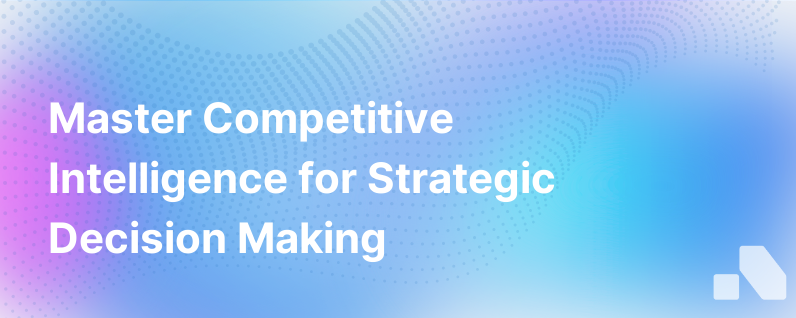
In today’s fast-paced business landscape, having a deep understanding of your competitors is a requirement, not a luxury. For many organizations, however, competitive intelligence is often neglected or given minimal attention.
Competitive intelligence is a strategic approach to understanding and anticipating your competitors' actions, thereby enabling your organization to stay ahead of the curve. It's not simply about reacting to others; it's about designing a well-informed strategy that helps you meet your business goals while differentiating your offering in the marketplace.
From paving the way for successful goal setting to providing valuable information on how to position your products effectively, the importance of prioritizing competitive intelligence cannot be overemphasized.
Below, we delve into the reasons why prioritizing competitive intelligence is critical and how to effectively implement it for better business outcomes.
Drives Strategic Decision Making
Strategy underpins every successful business. However, creating an effective strategy requires thorough market understanding – and that's where competitive intelligence fits in.
By comprehensively analyzing your competitors' strengths, weaknesses, opportunities, and threats (SWOT) alongside your organization’s own SWOT, competitive intelligence helps you to craft informed strategic decisions.
Facilitates Market Understanding
Competitive intelligence goes beyond knowing just your competitors. In the process of gathering data on competitor strategies, new launches or market shifts, it also offers insights into the changes in the larger market landscape.
Such insights can shed light on emerging trends, shifting audience preferences, innovative technologies or approaches, thus helping you align your business to the changing demands of the market.
Supports Product Development
Competitive intelligence feeds into the understanding of what features, functions, or innovations in your products might attract customers. Reviewing competitor product offerings, understanding their USPs, and recognizing any gaps they aren't satisfying can help drive forward your own product development.
Boosts Sales Pitch
Your sales team needs to understand not just what you're selling but also what your competitors are offering to effectively sell your products or solutions. A deep understanding of the competitor landscape can help craft stronger sales pitches that highlight your unique selling points further bolstering your sales performance.
Risk Management
Predicting competitor moves can help you reduce business risks. Whether it’s spotting a new disruptive product early or realizing that a competitor’s new strategy is failing, competitive intelligence can assist you in navigating and mitigating potential adverse situations.
With these advantages in mind, how can organizations begin prioritizing competitive intelligence?
Building a Competitive Intelligence Strategy
Here are some steps to effectively prioritize and implement competitive intelligence in your organization.
- Identify Key Competitors: Begin by recognizing the main companies that are direct threats to your customer base or share the same pool of potential clients.
- Define Intelligence Objectives: Determine what information is most important to your company's decision-making processes. These objectives depend on your business goal and can range from product development to sales.
- Gather Information: Leverage tools and resources like online databases, social media, reviews, press releases, and more to gather as much data as you can on your competitors. Automate this process for maintaining up-to-date and real-time insights -- AI platforms like Aomni can prove helpful in this aspect.
- Analyze the Information: Having a pile of data is not beneficial if it is not analyzed accurately. Use the collected information to discern patterns, get insights, and predict future moves.
- Take Action: The ultimate goal of competitive intelligence is to drive action. Ensure the insights gained are circulated within the company and are utilized in decision making.
The Future of Competitive Intelligence
Advancements in AI and machine learning are transforming the field of competitive intelligence. These technologies cut down the effort and time required to gather data, facilitate real-time insights, and automate analysis.
For instance, platforms like Aomni offer real-time account research and competitive insights. Such solutions streamline your competitive intelligence process, ensuring you can react swiftly, stay informed of market shifts, and stay ahead of the competition.
In conclusion, prioritizing competitive intelligence is not just about staying knowledgeable on your competitors but about being able to make informed decisions, foresee potential risks, and carve out a unique place in the market for your company. By leveraging the right tools and strategies, companies can effectively harness the power of competitive intelligence to drive business success.